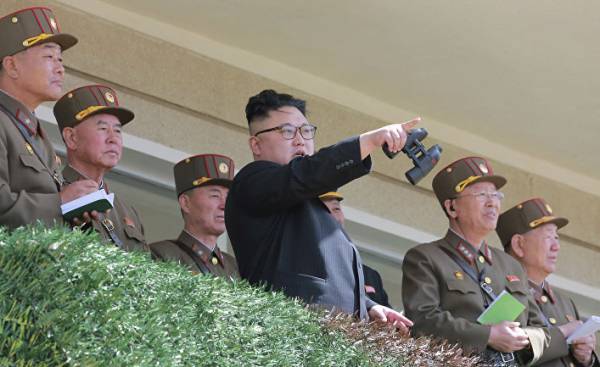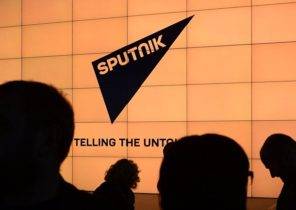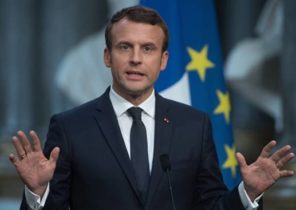
On the streets of Pyongyang these days, there is an unusual picture, even with the inferiority of the local economy: in front of the few gas stations in town have a line of cars. At the gas station, called the “Diplomat”, “Seven stars” or Korea Airline themselves deliberately designed for the privileged members of society. According to the correspondent of the Chinese newspaper Global Times man Cucina (Mang Jiuchen), starting Monday, sales of gasoline are limited. No problem to buy it can only foreign diplomats or drivers with special passes.
According to the Chinese reporter, the gas station stopped to get fuel. His colleague from the Associated Press, the only accredited Western journalist in Pyongyang, observing the behavior of gasoline prices, and found that over the weekend last week, they rose with 0.70-0.80 USD per liter for 70% to about $ 1.25.
The regime of Kim Jong-UN, apparently, is preparing for new sanctions. Representatives of the United States, Japan and South Korea involved in frozen in 2009, the six-party talks with North Korea and demanded Pyongyang to abandon its nuclear and missile programs. The President of the United States Donald trump is in favour of tougher measures taken by the UN security Council against North Korea. From the nearest neighbor and ally — China — press, it seems, is also enhanced.
On North Korea travel 240 thousand passenger cars, and almost all Chinese
Global Times recently openly warned that China is going to cut off the supply of oil to North Korea: “If North Korea will make the sixth nuclear test, Beijing would support tougher sanctions from the UN, in particular, the oil embargo”. This is the Chinese government needed to demonstrate hardness, because it is from China, Pyongyang gets nearly all the energy.
In 2015, according to customs, South Korean trade office and Trade centre of the United Nations, shipments from China to North Korea amounted to 525 thousand tonnes of crude oil. It was added to 218 thousand tons of refined oil and gasoline, which is six times more of Russian export in the same year. According to North Korean Internet website North Korean Economy Watch, there are about 240 thousand passenger cars, in particular, a few thousand private vehicles and taxis. Almost all of them produced in China.
Total turnover of North Korea in 2016 increased slightly compared with the previous year, and amounted to six billion dollars. Of them 5.5 billion (i.e. 91.5 per cent) was from China. Thus, the Kim regime in economic terms, almost entirely dependent on the great neighbor. It is followed by India (140 million dollars) and the former allies of Russia (about us $ 76 million).
Beijing sent back North Korean ships with coal
So China, being the largest trading partner and guarantor of energy supplies to Pyongyang, have the ability to affect that. In particular, in 2006 the Chinese have supported the UN sanctions, when the DPRK made its first nuclear test, thus violating resolution of the United Nations. However, the trade turnover between the countries has continued to grow. Only at the beginning of this year, Beijing seems to have decided seriously to implement its promises regarding sanctions.
19 Feb China until the end of this year, has refused to import North Korean coal. 7 APR customs service China further demanded to send back everything, even have already arrived at Chinese ports to North Korean ships with anthracite coal in the holds. It was on the day of negotiations of the President of the United States of Donald trump and Chinese President XI Jinping in Florida, during which they agreed to stop the arming of the DPRK.
As additional precautionary measures to address Pyongyang’s Beijing suspended officially organize trips of Chinese citizens in North Korea. In a third step, to force the DPRK leadership to sit down at the negotiating table and cease provocations provided a stop of deliveries of oil and oil products in the neighboring country.
Chinese banks and companies to face sanctions
However, the leadership of China is not acting entirely voluntarily. The fact that Chinese companies in case of refusal of sanctions against Pyongyang threatened punitive measures. In early April, just before meeting trump and President XI Jinping meets us national security Council for Asia Matthew Pottinger (Matthew Mercer) during a press conference, warned of possible new sanctions “for the second row.”
In the first place, they would affect the Chinese enterprises who secretly continued to trade with the DPRK, ignoring UN resolutions. In turn, the U.S. Treasury has also prepared a list of Chinese financial institutions, which would be subjected to punishment in case of business relations with North Korea.
The reason to doubt the integrity of China became its own conflicting statistics given at the beginning of April. Then the representative of customs said that coal imports from the DPRK in the first quarter of this year decreased compared to the first quarter of last 51.6 per cent to just 2.67 million tons. Thus, according to him, total trade with North Korea during this time increased by 37.4% to 8.4 billion yuan (1.13 billion dollars).
Import of textile products from Korea rose sharply
North Korea put China in a variety of goods 462 million euros (an increase of more than 18%). China, in turn, has set the neighboring country of goods to 668 million euros (an increase of 54%). Thus, the rejection of the North Korean coal does not play a special role for General trade. At the same time, the total positive balance of China has increased to 1.52 billion yuan, exceeding the indicators of the first quarter of 2016 3.9 times.
The representative of the Chinese customs did not specify how that was possible. At the same time, I must say that many of the goods whose turnover is large enough, do not fall under UN sanctions. In particular, talking about the production of the textile industry. According to relevant Internet sites, China in 2014 bought North Korea of textile products at $ 800 million. Four years earlier the figure was just 190 million.
The latest statistics, the Chinese side has not released. Unknown also imports gold, copper, zinc and rare earth metals. In fact, they fall under the sanctions, but, according to North Korean Economy Watch, the trafficking continues.
Supplies through private markets
In turn, Chinese consumer goods is actively arrive on the North Korean markets. The correspondent of the Austrian channel ORF in Beijing, Raymond Leo (Raimund Löw) was surprised, when at the beginning of April, he was allowed to visit Pyongyang in the private market, Tong-Il (Tong-Il), and he saw the goods sold there.
In the market of Tong-Il has installed a total of 1,700 stalls, where you can see almost everything — from clothes and food to computer equipment. The sellers claimed to have produced all these goods by yourself or purchased and local family businesses.
However, it was obvious that most of these products are produced in China. Lev was strictly forbidden to produce in the market any shooting. However, it was not a “Potemkin village” on the North Korean way. At the end of 2016, a South Korean research Institute, KINU, based on the performance of the service Google Earth and the testimony of witnesses, counted on the territory of its Northern neighbor a total of 404 official major market is regulated at the state level peasant markets.







